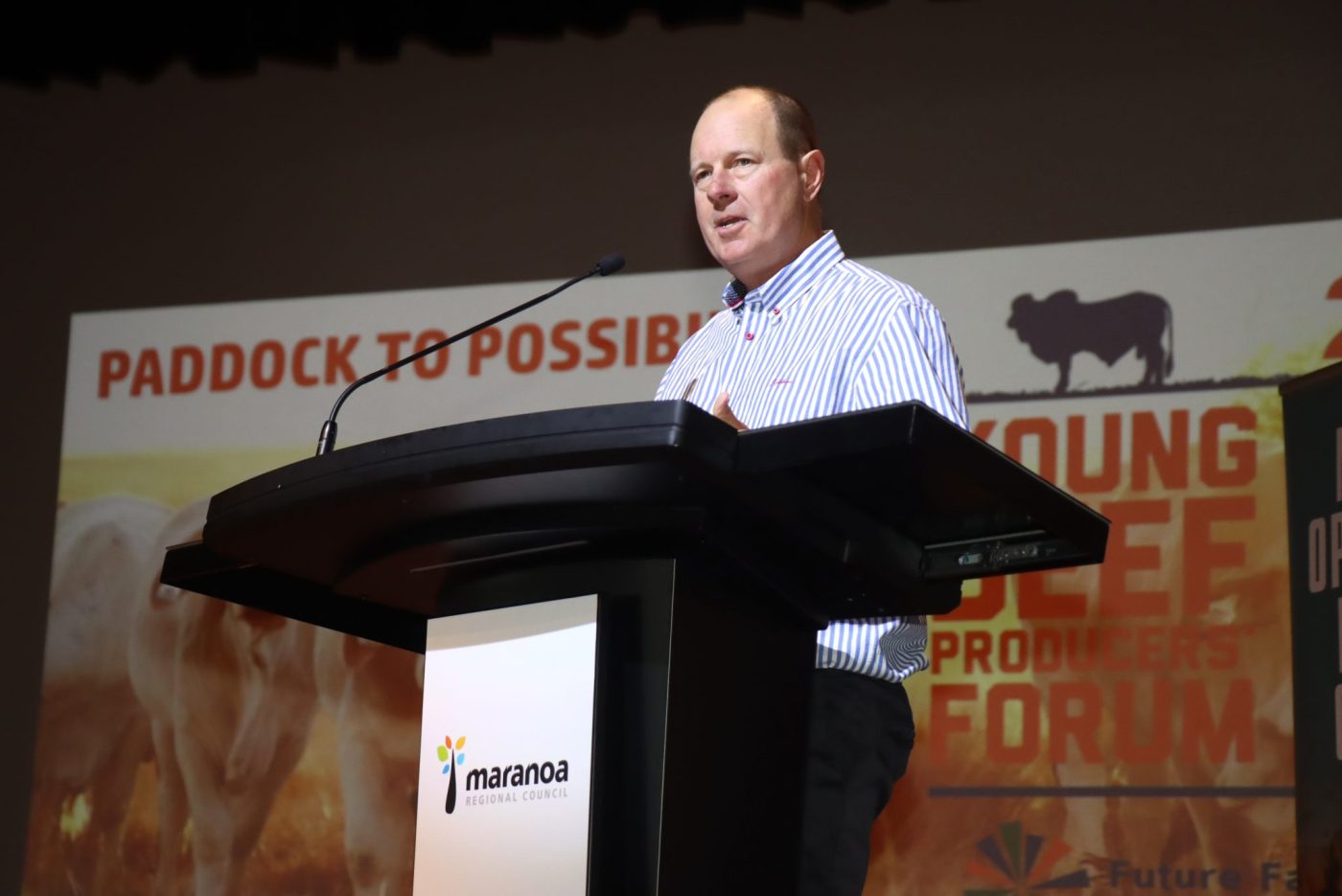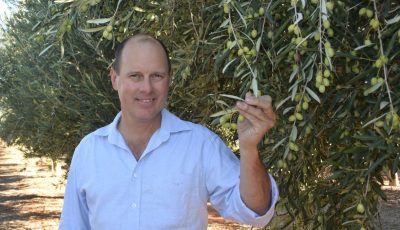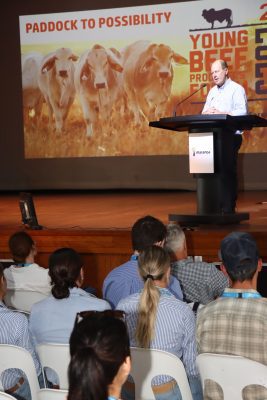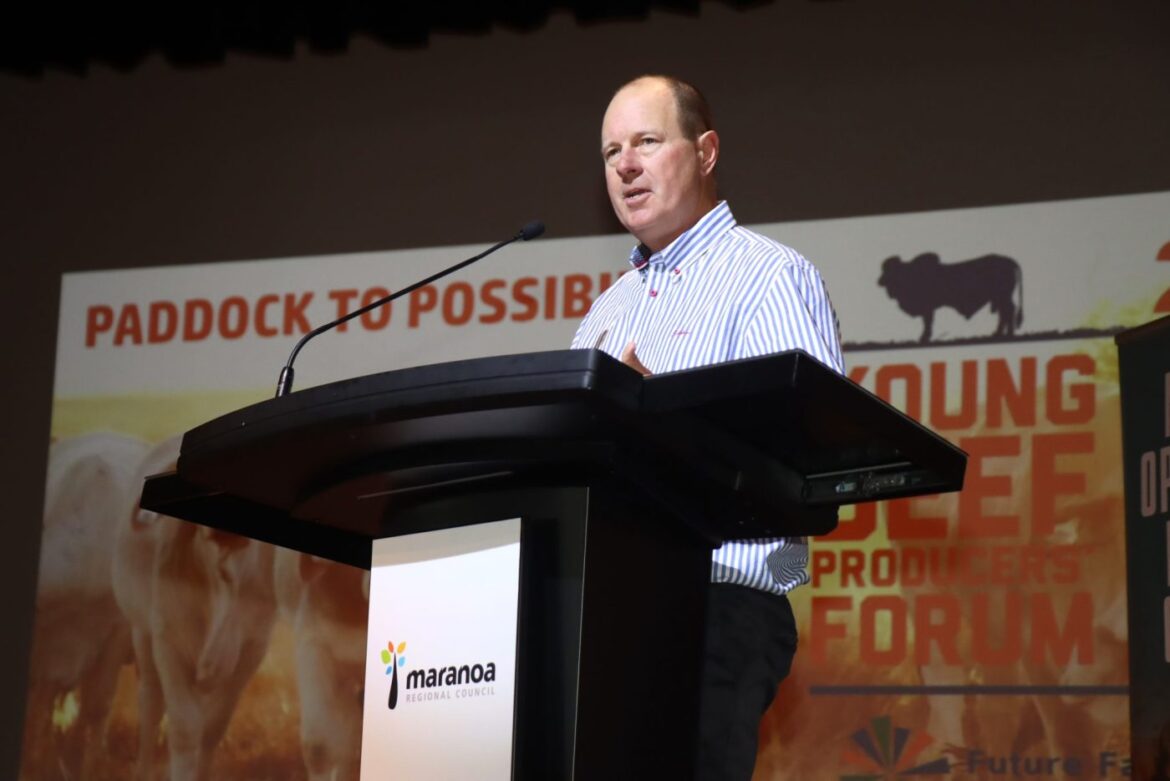
NEARLY half of all olive oil sold at retail in Australia comes from a single company built by a boy from a western Queensland cattle property and a mate he met at Marcus Oldham College.
If you’ve drizzled olive oil onto a salad or into a frypan, chances are you will know the brand well – Cobram Estate.
It’s hard to imagine a story that more fittingly embodied the theme of the 2025 Young Beef Producers Forum at Roma – “From Paddock to Possibility” – than the story of how Rob McGavin and Paul Riordan built their own globally recognised olive oil empire over the past 20-odd years.

Rob McGavin. Picture: Australian Olive Oil Association.
From the paddocks of western Queensland to the classrooms of Marcus Oldham and a humble start borrowing $245,000 to buy a small vineyard in South Australia, their business has grown from early possibility into the reality of now being Australia’s biggest olive oil producer with a market capitalisation of $1.5 billion.
It is a success story that has been built on gaining a competitive edge through an unswerving commitment to high-quality production, investing deeply in research to achieve world-leading production standards and efficiencies, creating a work environment that people enjoy being part of and are able to grow in, and having the drive and persistence to push through the dark days that can inevitably beset any long-term business – as Rob and Paul have indeed experienced first-hand.
A few stats help to illustrate the Cobram Estate business as it stands today:
It is Australia’s largest vertically integrated extra virgin olive oil company
Operates across both Australia and the United States
Has 19,000 hectares of farmland
6 million olive trees
Produced more than 13 million litres of olive oil in FY2024
Rob shared the story of Cobram Estates’ development and growth in a recent address to the Young Beef Producers forum at Roma.
Work ethic instilled at an early age
Central to his message was the core theme of ‘work ethic’ – something that he said was instilled into him, his brother and sister at a very young age by their hard-working dad, who raised the family on his own while running his cattle property following the tragic death of their mother when the children were all aged under nine years old.
 Rob started his address by commending the large number of people in the room for attending, saying Australia was lucky to have such enthusiastic young people working on the land.
Rob started his address by commending the large number of people in the room for attending, saying Australia was lucky to have such enthusiastic young people working on the land.
“I’m not just saying this to you, I say it to everyone, those that are brought up on the land, or work on the land, have just got a huge mental advantage, because you learn to work, and you learn to solve problems and you don’t have to do just mindless jobs when you’re on a farm.”
He also paid tribute to life-shaping lessons he learned from his dad.
“Dad knew nothing about book work. He only went grade six. Mum did all of that, and all he knew how to do was work. He hated going on holidays or doing anything like that.”
Rob said the greatest compliment his father would give was that they were “pretty handy”.
Next was “handy”, which meant they were okay.
“But then if you fell into the next bracket, which is useless, that wasn’t so good,” he recalled.
“And the worst, they were useless bastards.
“So we tried to avoid being on that end, but occasionally we were called useless bastards.”
Rob explained that their dad was of the view that school should not get in the way of a good education, and the kids missed plenty of primary school days while learning the practical lessons of the bush and agriculture helping their father on the property.
When returning home from boarding school for holidays, Rob said their school-softened hands would be put straight to work gathering blisters on crowbars and shovels cleaning out grids on the main road.
“Anyway he thought that was that was just what we needed,” Rob said with a laugh.
It seems fair to say that despite being fortunate to have had the practical and grounded upbringing he did, Rob differs from his father in his own views on the importance of a good education.
After finishing school and enjoying a few years working on Liveringa Station in the Kimberley, he ventured south to Geelong in Victoria to attend Marcus Oldham College for a year-long agribusiness course.
There he gained an accelerated introduction to practical business skills that would prove vital in his agribusiness career, including finance, management, accounting, tax returns, writing reports, lodging banking applications, micro and macro economics and basic law.
“These things are so important, because if you’re running a business for yourself or someone else, you need to know the basics today or you’re going to get fleeced.
“There are all these acronyms in law and general law and financial law, and all these things that if you haven’t got a very good idea about you’re just so far behind.”
Mortgaging the family farm
Armed with that grounding, Rob convinced his father to take a huge leap.
“I conned dad into mortgaging our farm to buy a vineyard in South Australia the year after I left Marcus.
“And I didn’t know anything about grapes. He took a massive risk. He didn’t even come and visit. Was only $245,000 and it was very profitable.
“The wine industry went well, and then Tim and I worked pretty hard on the vineyard developing it. The wine industry was good. We were just super lucky.”
As they price of grapes kept going up, they were able to keep writing new contracts, and reinvested after every harvest and kept expanding.
“We’d go back to the bank after every harvest and borrow more money and plant more grapes, write another contract.
“And that was really where Tim and I were set up financially.”
In 2004 they sold 80 percent of the vineyard for “a bit over $10 million”, clearing their borrowings of about $5 million.
“It was a massive start, huge start. And if we didn’t have the mortgage on the farm at Barcaldine, even though it was pretty small, we wouldn’t have been able to have that opportunity.”
He urged the young audience to think about the fortunate position many of them are in.
“Pretty much everyone is born in Australia has won birth lotto, but some people have seriously won birth lotto, and they were born into money or opportunities. And with that comes a huge obligation to be modest and humble and understanding that it’s not you being smart, it’s you being lucky.”
“And I always say to our students at Marcus, when you graduate, you have this incredible opportunity, you’ve got to be a lot nicer to everyone else, just because you’re so lucky.
“And if you want to be successful, you’ve got to bring people along from all walks of life, you’ve got to make them feel important, and you’ve got to understand that you are lucky.
“And with that comes a lot of obligation in your role in the community, your generosity, your empathy to people that are in a tough time, and all those things.”
Building Cobram Estate and surviving the tough years
After Marcus, Rob and Paul began planting olives alongside the vineyard purchased in South Australia. Very quickly they realised scale would be everything.
“We just realised unless we raised $15 million we wouldn’t be able to plant enough olives to have any scale to compete. We were only going to be growers and not have a brand.”
“We were only like 23 and we didn’t have 15 cents let alone $15 million.”
They went to family and friends for backing. The varieties we wanted to plant weren’t available in Australia, so they imported trees from Israel.
“It was just this whole learning.”
Rob admits they got some things wrong, but they still pushed ahead.
“It’s never, ever the problem, it is how you deal with it,” he told the young audience.
“And just if you’re so determined to just not give up, you will win.”
Dark days
The darkest days they faced – in fact a period Rob openly describes as “just 10 months of absolute and utter hell – came as a result of the Global Financial Crisis in 2007.
In addition to running their own growing Cobram Estate business they had been contracted to manage a large nearby neighbouring olive project owned by Managed Investment Scheme (MIS) operator Timbercorp.
When Timbercorp collapsed into administration during the GFC, Rob and Paul found themselves having to fund the harvest and operations for the failed business while dealing with banks, administrators and courts, just to keep the trees alive and preserve a chance to buy the asset and trade their way out.
The trees were ripe and in need of harvesting as the Timbercorp business collapsed. The cost to harvest was $250,000 a day. In effect they had to borrow $15 million to harvest the $30 million worth of fruit on the trees, in the hope they would be able to recoup those costs, without any commitment from the administrators or liquidators that they would be able to do that.
He said administrators or liquidators operated with “a completely different mindset”, and warned young producers to be extremely careful about ever making a decision to push their own businesses into administration.
At the same time a combination of the GFC, a rising Australian dollar and a rush of cheap imports into Australia was also making life difficult for Cobram Estate’s own business.
He said they faced some “shocking moments” when they thought the business may be foreclosed on by its banks. However, through cost-cutting and a focus on remaining cash flow neutral, the business survived.
“If you’re cash flow neutral, you go forever. If you’re burning money, you cannot go forever,” he said.
“If it means sacking three quarters of your staff to survive, you’ve got to do that… you can’t feel bad for the three quarters sacked. You’ve got to feel good for the quarter who will keep their jobs and then you can re-employ others.”
Low-cost, high-quality underpins competitive edge
Out the other side of the GFC, Cobram doubled down on productivity and quality.
“Anyone can grow an olive tree, but to get it to produce a lot is hard.”
The company invested heavily in research, with 30 peer-reviewed papers and “another 100” internal studies that have not been published helping the business to achieve world-leading production standards.
Cobram’s groves now average 60 percent more yield than the top 6 percent of growers globally.
“So per litre of olive oil produced we use 37 percent less water, 63 percent less nitrogen, 87 percent less phosphorus, purely because we’re so productive.
“And then on the other side of the equation, the quality is high, and all value to a consumer in olive oil is in the quality.”
That combination – lowest cost and highest quality – is usually an oxymoron, Rob said, but it is what has underpinned Cobram’s growth and brand strength.
Harvesting and processing are geared entirely around maintaining product quality.
“There’s something like 60 billion olives on our farm that we crush within four hours of harvesting.
“We process seven days a week, processing thousands of tonnes of fruit to get the oil out in a hurry to have a fresh, high quality product.”
Never break consumer trust
Rob also emphasised the importance of never breaking the trust of your consumer.
He explained that some olive oil products which are labelled “extra light” or “pure” are made from poor-quality oil refined with heat and chemicals, then shipped to Australia and sold at similar prices to genuine extra virgin, which is 100 percent pure olive oil.
Cobram spends a lot of time educating consumers about the quality of its product, including flying hundreds of “influencers” each year to its groves to see harvest and processing first-hand.
They also strictly ration only the best oil into the Cobram brand.
“We will never put more than half of our production into Cobram,” Rob said.
“People might say ‘Oh, that’s a bit stupid, you can make more money in Cobram.’
“But if we put all of our production into Cobram, we’re going to mine the quality, and we’ve only got to our position because of the quality.
“So if we want to grow Cobram we have to plant more groves, because no more than half can go in.
“We know half of our production is going to be fantastic, and the other half, depending on the season might be good, but it might also be average.”
Lessons for young beef producers
While Rob’s primary business today is olive oil, he also has a cattle property at Barcaldine.
Much of his talk could serve as a playbook for building a paddock-to-plate brand in any ag commodity.
Some key messages he left the young audience with included:
Use debt wisely, but respect the bank–borrower dynamic. “Banks are hugely important to your business, and there’s absolutely nothing wrong with debt. And for $50,000 you can get the use of a million dollars a year.
“But what you do need to remember is that when you don’t need the money, the banks are just there trying to give it to you.
“And it’s like they just want to put a umbrella over you when the weather’s perfect, and as soon as it rains or there’s a storm, they pull the umbrella and run away.
“So you use them, but just be very mindful.”
Invest in people and culture. “Businesses don’t do business with businesses, people do business with people.”
Lead with modesty, empathy and integrity. He said leaders need skills, experience and an X-factor based on “modesty, empathy, integrity and passion”.
“They are hugely important things, and you just you want them to care.”
Timing matters as much as management. Pointing to his home town of Barcaldine as an example, he pointed out that similar country and rainfall had produced both very wealthy producers and others whose businesses had not survived – and often that came down to the timing of when they bought land and stock, not just how they ran them.
Be patient for the right idea. “You only need one good idea… you’ve just got to be careful you don’t push in your rush to try and get an idea that you don’t get a bad idea that really dings your confidence and blows your money up. “There’s so many people who have had their one idea when they’re 40, but as long as there’s not too many bad ones along the way.
“And working with someone else, getting that experience, when you work with someone else, you’re making mistakes with their money, and obviously successes as well, and getting experience with their money. And so the longer you stay in that until these ideas come, the better.”
For a room full of young beef producers at the start of their own journeys, he continually stressed the importance of having a good work ethic and making good use of your available time.
‘The only place that success comes before work is in the dictionary’
“The only place that success comes before work is in the dictionary,” he said.
“And everyone’s got the same amount of time. And if you just think about that for a minute, Elon Musk has got the same amount of time as all of us.
“It’s just freaking incredible how some people do what they do.
“So don’t think sort of you don’t have time. Just think about how you make time, and it’s all around how you prioritize your time.
“Just to think that Elon has the same amount of time as the rest of us, and what he does is next level, like him or not.”


Dining and Cooking